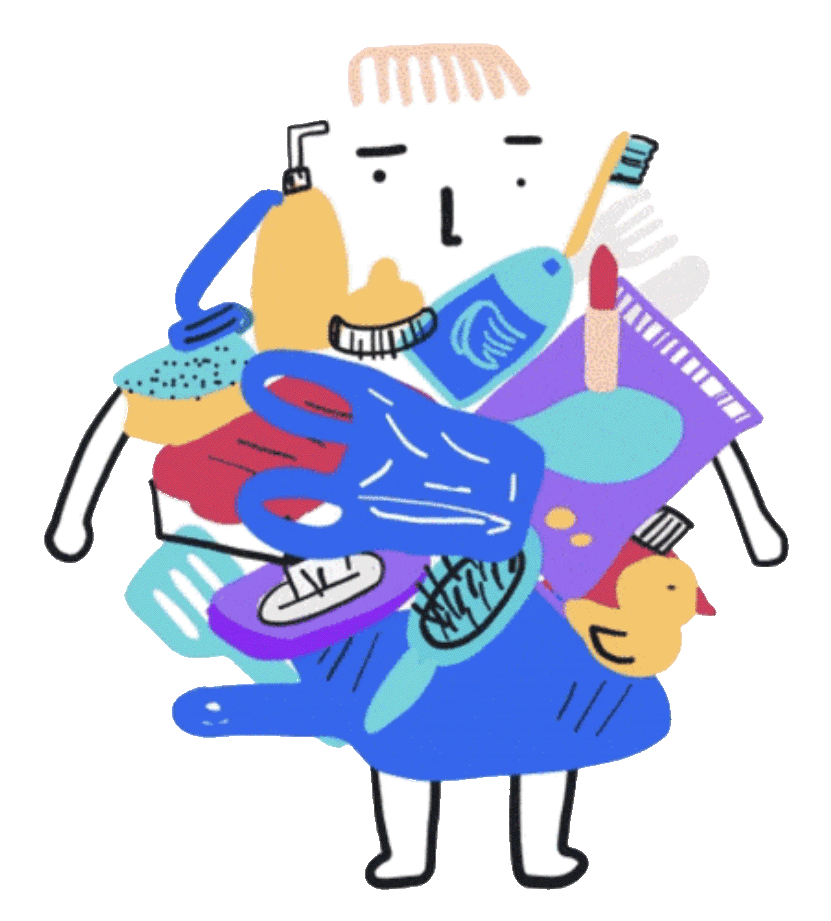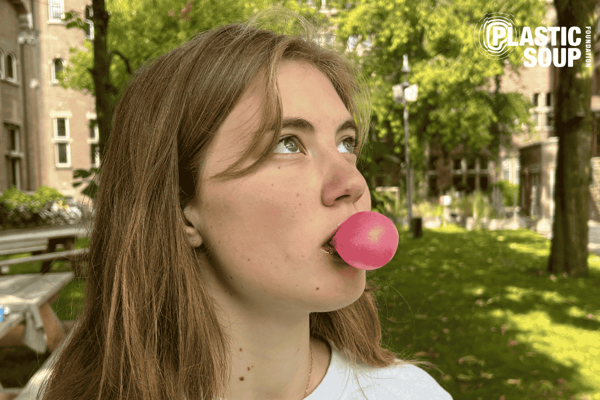For the course ‘De maatschappij ben jij’ (Society is you), five fourth-year Commercial Economics students from the Amsterdam University of Applied Sciences collaborated with the Plastic Soup Foundation on the Stop The Plastic Chew campaign. Their goal: to make young people aware of the plastic in traditional chewing gum. We spoke with Ilse Brinkkemper, Britt Lasschuit, Sander van Doorn, Sam van de Sanden, and Mick Schouten about their project, motivations, and insights.
The assignment
Mick (23), Britt (22), Sander (22), Sam (28), and Ilse (21) are studying digital marketing as part of their Commercial Economics degree at the Amsterdam University of Applied Sciences. In addition to content and market research, sustainability plays a major role in their studies. For the course ‘De maatschappij ben jij’ (Society is you), they were assigned to collaborate with a foundation or company to campaign for a social cause. That assignment formed the basis for their collaboration with the Plastic Soup Foundation.
Why they chose the Plastic Soup Foundation
During brainstorming sessions, the students noticed how much litter there is every day in the city and around the university. That became the starting point for their social theme. The Plastic Soup Foundation's mission to stop plastic pollution at the source immediately appealed to them. The fact that plastic production is growing every year particularly motivated them to work with us.
How contact with the Plastic Soup Foundation came about
Britt was already familiar with the organization, so the team decided to send an email to the address on the website. This was quickly followed by a video call with Simone Willemse. Her story made a big impression, especially the revelation that traditional chewing gum contains plastic, a fact that none of the students knew. This made them immediately enthusiastic about a collaboration.
The students' contribution to Stop The Plastic Chew
The students developed content to raise consumer awareness of the plastic in chewing gum. They targeted young adults (aged 18–35) via TikTok, Instagram, and LinkedIn. They also helped with physical activities, such as handing out plastic-free chewing gum from BenBits at Utrecht Central Station. Their efforts ensured that people not only discovered that they were chewing plastic, but could also try an alternative right away.
Learning from a real social campaign
The students learned how a campaign comes to life in practice. “It's one thing to have a concept or strategy on paper, but it's quite another to actually implement it and see how people respond. We learned how important it is to make the message clear, accessible, and appealing to the target audience,” said the students.
The collaboration with the Plastic Soup Foundation and BenBits
The collaboration with both the Plastic Soup Foundation and chewing gum brand BenBits was considered a unique and educational experience. Mick, Britt, Sander, Sam, and Ilse found it very enjoyable and special to see a company doing something out of passion and the entire team working together to achieve something. The shared mission of both organizations made the project even more inspiring.
The biggest surprise about plastic in chewing gum
The fact that traditional chewing gum contains plastic came as a big surprise to everyone in the group. Because chewing gum is not considered food, this ingredient does not have to be listed on the packaging. As young adults who are conscious about what they eat, they were quite shocked by this.
Collaboration within the student team
The team worked closely together: regular consultations, feedback rounds, and checking each other's work ensured that they could make quick adjustments. This approach kept the process structured and efficient and allowed ideas to be continuously refined.
What the students took away from the project
The students mainly took away what it is like to develop and implement a campaign from start to finish. They learned how important it is to really understand the target group and to translate a message in a creative way. In addition, the project made them personally more aware of everyday products, such as chewing gum, and their impact on health and the environment.
What the students are most proud of
The team looks back with pride on their contribution to a social issue that is close to their hearts: plastic pollution. The team: “It feels special to see that our work not only resulted in a creative campaign, but also actually contributes to raising awareness and changing people's behavior.”
Would you like to contribute to an existing Plastic Soup Foundation campaign as part of your studies? Send an email to educatie@plasticsoupfoundation.org with relevant information to see if there is a match.
.png?version=18582)





.png?version=17770&width=600)
.png?version=18376&width=600)